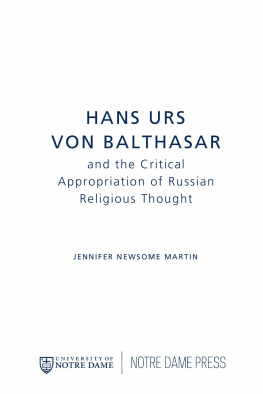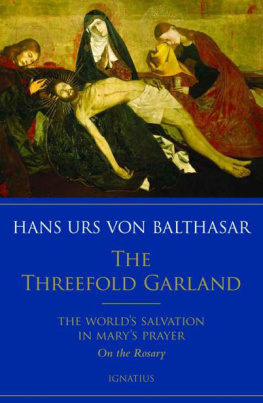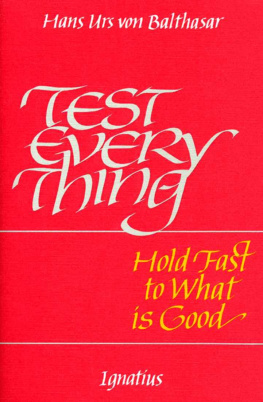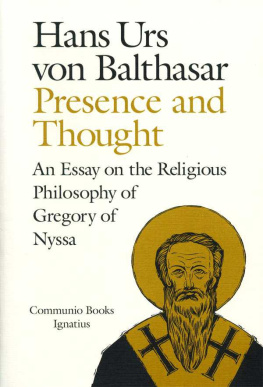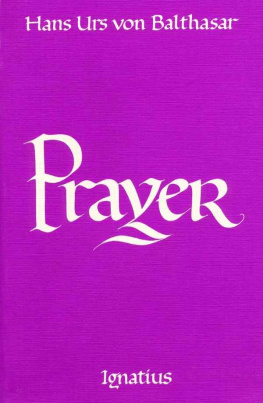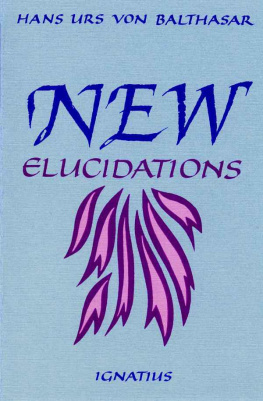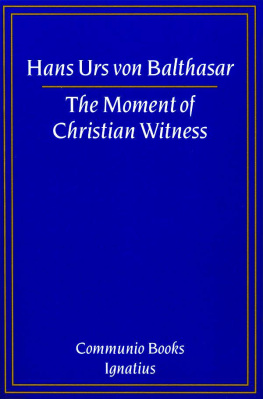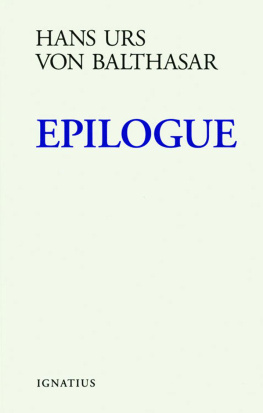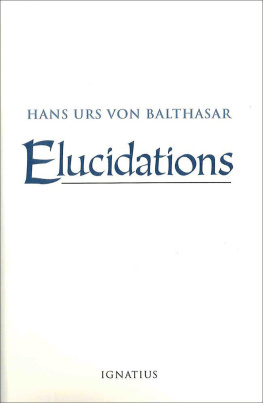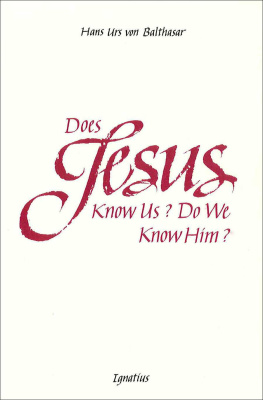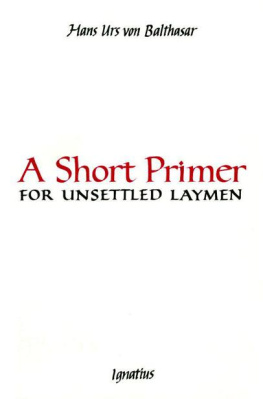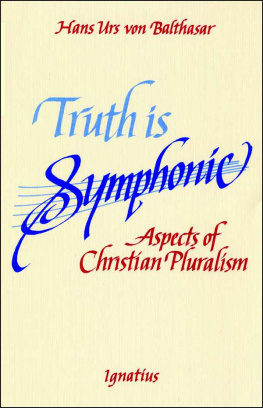
HANS URS VON BALTHASAR
and the Critical Appropriation of Russian Religious Thought
HANS URS VON BALTHASAR
and the Critical Appropriation of Russian Religious Thought
JENNIFER NEWSOME MARTIN
University of Notre Dame Press
Notre Dame, Indiana
University of Notre Dame Press
Notre Dame, Indiana 46556
undpress.nd.edu
All Rights Reserved
Copyright 2015 by the University of Notre Dame
Published in the United States of America
The Press gratefully acknowledges the support of the Institute for Scholarship in the Liberal Arts, University of Notre Dame, in the publication of this book.
Library of Congress Cataloging-in-Publication Data
Martin, Jennifer Newsome.
Hans Urs von Balthasar and the critical appropriation of Russian religious thought / Jennifer Newsome Martin.
pages cm
Includes bibliographical references and index.
ISBN 978-0-268-03536-5 (pbk. : alk. paper)
ISBN 0-268-03536-9 (pbk. : alk. paper)
ISBN 978-0-268-08701-2 (web pdf)
1. Balthasar, Hans Urs von, 19051988.
2. Philosophy, Russian20th century. I. Title.
BX4705.B163M37 2015
230.2092dc23
2015031758
The paper in this book meets the guidelines for permanence and durability of the Committee on Production Guidelines for Book Longevity of the Council on Library Resources.
ISBN 9780268158750
This e-Book was converted from the original source file by a third-party vendor. Readers who notice any formatting, textual, or readability issues are encouraged to contact the publisher at .
To Jay, sine qua non,
and to the eternal memory of Douglas Michael Shippy
(19782002),
our dearest and most loyal friend.
CONTENTS
I owe a great debt of gratitude first to my doctoral advisor and friend Cyril ORegan, for demonstrating an extraordinary example of the elegance and artfulness of the theological craft, and for practicing it in good faith rigorously, responsibly, and without affectation. Thank you, Cyril, for reading drafts of this work with equal measures of swiftness, generosity, and practical wisdom, and for taking me as and holding me to my best self. Though he would certainly protest the characterization, his genius and saintliness are supreme manifestations of a life of faith, and proof that such a life is indeed possible.
I am also grateful to Lawrence Cunningham for being a consistently supportive and encouraging presence from the time I came to the University of Notre Dame in 2005. Your scholarship, teaching, and friendship model a rare balance of deep erudition, great generosity, and genuine humility. I am especially grateful for your assistance in submitting this manuscript for publication at the University of Notre Dame Press. Thank you as well to John Betz for kindly serving as a reader of this text in its nascent form as a dissertation, and especially for the searching questions about the status of Schellings contribution, which I am still thinking about how best to answer.
I wish also to thank the many other kind and generous people associated with the theology department at the University of Notre Dame who have assisted and encouraged me throughout, especially Mary Catherine Hilkert, who has mentored and advocated for me in many ways, and Robin Darling Young, who introduced me to Pavel Florensky over scotch in the summer of 2006 and started my long captivation with the Russians. A special thank you to my fellow classmates at Notre Dame, especially to Todd Walatka, whose willingness to read even the least-developed versions of my drafts improved the final work tremendously. Thanks also to Michael Altenburger for patiently checking the proofs.
To my colleagues in the Program of Liberal Studies, especially Gretchen Reydams-Schils, Julia Marvin, Pierpaolo Polzonetti, Joseph Rosenberg, Tom Stapleford, and Henry Weinfield: thank you for welcoming me enthusiastically into this rich and close-knit group of scholars and friends. Abundant thanks are also owed to the extended community of Balthasar scholars, especially Tony Sciglitano, whose excellent scholarship, remarkable personal graciousness, and generous friendship humble and hearten me.
At the University of Notre Dame Press, I am indebted to the editorial board as well as the readers of this manuscript, who provided enormously intelligent, detailed, and serious engagement with the text in their written reports. The book is much improved because of your careful attention and judicious suggestions. Thank you particularly to acquisitions editors Charles Van Hof and Stephen Little for your efforts in bringing this book to publication. I am grateful for the tireless work of Wendy McMillen, Susan Berger, and Rebecca DeBoer, and the many other supremely helpful people at the University of Notre Dame Press. I wish also to thank the Institute for Scholarship in the Liberal Arts for generously providing a grant for indexing. The book is also much improved due to the decisive and elegant work of copy editor Kellie Hultgren, to whom I remain grateful. Whatever infelicities, errors, or omissions that might inadvertently remain are my own.
I am thankful to my parents, stepparents, and parents-in-law, whose unfailing love is a testament to the unspeakable gratuity of the grace of God. Thanks especially to my beautiful children, James, John Moses, and Mary Frances Clare, whose ever-present affections and interruptions prevent me from ever taking myself too seriously. Above all, I am indebted to my friend and husband, Jay Martin, for reading, editing, and offering extraordinarily profitable criticisms to this manuscript, and especially for first introducing me to Balthasars theology so many years ago. Far more, I am immensely grateful for your infinite patience, honesty, sense of humor, and profoundly self-givingeven kenoticlove, in the rather unglamorous vicissitudes of the daily life of two distracted academics with three small children. Thank you for being a true partner in scholarship, parenthood, friendship, and marriage.

DER SEELEN WUNDERLICHES BERGWERK
On the Subterranean and the Speculative
Rainer Maria Rilkes great mythological poem Orpheus. Eurydice. Hermes, from which this chapters title is drawn, conjures a ghostly scene of the abortive attempt to lead Eurydice through the liminal space between the underworld and the world of the living. As the myth goes, Orpheus cannot contain himself and casts a forbidden backward glance at the two light-footed travelers tracking him, and his beloved Eurydice must return with Hermes to Hades.1 The following conjugation of Swiss Catholic theologian Hans Urs von Balthasar (19051988) with several, far from homogenous figures of the nineteenth-century Orthodox Christian Russian school, specifically Vladimir Soloviev (18531900), Nikolai Berdyaev (18741948), and Sergei Bulgakov (18711944), and their primary German Romantic interlocutor, F. W. J. Schelling (17751854), constitutes a subterranean excavation of its own, albeit with hopes of greater success.2
Resonant with Rilkes poetic rendering of the Orpheus myth, this book is likewise an excavation requiring not only a certain degree of coaxing in order to draw out Balthasars un- or underacknowledged lines of pedigree from these theologians of the Russian diaspora, but also a delicacy in negotiating instances of the shadowy in-between, whether between form and content, finite and infinite, body and spirit, time and eternity, life and death, heaven and hell, fidelity to Christian tradition and robust engagement with modernity, and so on. Nor is it irrelevant that the dense symbolic image of the
Next page
